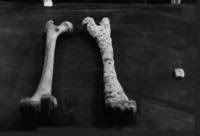Sandra felt as low as the heels of her Birkenstocks as she pushed against a November gust and the florist shop door. Her life had been easy, like spring breeze. Then in the fourth month of her second pregnancy, a minor automobile accident stole her ease.
During this Thanksgiving week, she would have delivered a son. She grieved over her loss. As if that weren't enough, her husband's companythreatened a transfer. Then her sister, whose holiday visit she coveted, called saying she could not come. What's worse, Sandra's friend infuriated her by suggesting her grief was a God-given path to maturity that would allow her to empathize with others who suffer.
"She has no idea what I'm feeling," thought Sandra with a shudder. Thanksgiving? Thankful for what? She wondered. For a careless driver whose truck was hardly scratched when he rear-ended her? For an airbag that saved her life but took that of her child?"
Good afternoon, can I help you?" The shop clerk's approach startled her.
"I....I need an arrangement," stammered Sandra.
"For Thanksgiving? Do you want beautiful but ordinary," asked the shop clerk, "or would you like to challenge the day with a customer favorite I call the Thanksgiving 'Special?'. Are you looking for something that conveys 'gratitude' this Thanksgiving?"
"Not exactly!" Sandra blurted out. "In the last five months, everything that could go wrong has gone wrong." Sandra regretted her outburst, and was surprised when the shop clerk said, "I have the perfect arrangement foryou.
"Then the door's small bell rang, and the shop clerk said, "Hi, Barbara...let me get your order." She politely excused herself and walked toward a small workroom, then quickly reappeared, carrying an arrangement of greenery, bows, and long-stemmed thorny roses. Except the ends of the rose stems were neatly snipped; there were no flowers.
"Want this in a box?" asked the clerk.
Sandra watched for the customer's response. Was this a joke?
Who would want rose stems with no flowers! She waited for laughter, but neither woman laughed.
"Yes, please," Barbara replied with an appreciative smile.
"You'd think after three years of getting the special, I wouldn't be so moved by its significance, but I can feel it right here, all over again." She said as she gently tapped her chest.
"Uh," stammered Sandra, "that lady just left with, uh....she just left with no flowers!"
"Right, said the clerk, "I cut off the flowers. That's the Special. I call it the Thanksgiving Thorns Bouquet."
"Oh, come on, you can't tell me someone is willing to pay for that!", exclaimed Sandra.
"Barbara came into the shop three years ago feeling much like you feel today," explained the clerk. "She thought she had very little to bethankful for. She had lost her father to cancer, the family business was failing, her son was into drugs, and she was facing major surgery.
"That same year I had lost my husband," continued the clerk, "and for the first time in my life, had just spent the holidays alone. I had nochildren, no husband, no family nearby, and too great a debt to allow any travel."
"So what did you do?" asked Sandra.
"I learned to be thankful for thorns," answered the clerk quietly. "I've always thanked God for good things in life and never to ask Him why those good things happened to me, but when bad stuff hit, did I ever ask! It took time for me to learn that dark times are important. I have always enjoyed the 'flowers' of life, but it took thorns to show me the beauty of God's comfort.
"You know, the Bible says that God comforts us when we're afflicted, and from His consolation we learn to comfort others.
"Sandra sucked in her breath as she thought about the very thing her friend had tried to tell her. "I guess the truth is I don't want comfort. I've lost a baby and I'm angry with God.
"Just then someone else walked in the shop. "Hey, Phil!" shouted the clerk to the balding, rotund man.
"My wife sent me in to get our usual Thanksgiving arrangement...twelve thorny, long-stemmed stems!" laughed Phil as the clerk handed him a tissue-wrapped arrangement from the refrigerator.
"Those are for your wife?" asked Sandra incredulously. "Do you mind me asking why she wants something that looks like that?"
"No...I'm glad you asked," Phil replied. "Four years ago, my wife and I nearly divorced. After forty years, we were in a real mess, but with the Lord's grace and guidance, we slogged through problem after problem. He rescued our marriage. Jenny here (the clerk) told me she kept a vase of rose stems to remind her of what she learned from "thorny" times, andthat was good enough for me. I took home some of those stems. My wife and I decided to label each one for a specific "problem" and givethanks for what that problem taught us.
"As Phil paid the clerk, he said to Sandra, "I highly recommend the Special!"
"I don't know if I can be thankful for the thorns in my life." Sandra said to the clerk. "It's all too...fresh."
"Well," the clerk replied carefully, "my experience has shown me that thorns make roses more precious. We treasure God's providential care more during trouble than at any other time. Remember, it was a crown of thorns that Jesus wore so we might know His love. Don't resent the thorns.
"Tears rolled down Sandra's cheeks. For the first time since the accident, she loosened her grip on resentment. "I'll take those twelve long-stemmed thorns, please," she managed to choke out.
"I hoped you would," said the clerk gently. "I'll have them ready in a minute."
"Thank you. What do I owe you?"
"Nothing. Nothing but a promise to allow God to heal your heart. The first year's arrangement is always on me." The clerk smiled and handed a card to Sandra. "I'll attach this card to your arrangement, but maybe you would like to read it first.
"It read: My God, I have never thanked You for my thorns. I have thanked You a thousand times for my roses, but never once for my thorns. Teach me the glory of the cross I bear; teach me the value of my thorns. Show me that I have climbed closer to You along the path of pain. Show me that, through my tears, the colors of Your rainbow look much more brilliant.
"Praise Him for your roses, thank Him for your thorns























